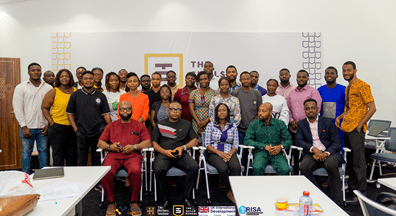Turning research into practical, market-ready solutions does not happen in a vacuum. It requires the collective effort of everyone involved in Ghana’s innovation ecosystem.
That is why we developed the Innovation Markets and Value Chain Map (IMVCM) – a tool that gives us a full, 360-degree view of the journey from research intent to market-utilisation of research output.
This framework doesn’t just lay out the stages; it highlights the key interactions between all the actors, innovation economies and systems that play a role in making research a reality in the marketplace, according to Chief Executive Officer of Heritors Labs Limited, Mr. Derrydean Dadzie
He further substantiated this claim by pointing out that, “But understanding the journey is only the first step. The real work lies in addressing the barriers that prevent us from fully realising the potential of our research. One of the biggest hurdles we face is access to funding and resources – the critical ingredients that allow ideas to evolve into tangible solutions”.
Professor Marian Dorcas Quain, the Deputy Director-General of the Council for Scientific and Industrial Research (CSIR) speaking at the training workshop for researchers, entrepreneurs and innovators on the newly-developed innovation market value chain map (IMVCM), organised by Heritors Labs through The Heritors Institute under the Skills School Initiative in partnership with key stakeholders in Accra called for better industry-academia-research partnership to advance the commercialisation of innovations and research works to the broader benefit of the economy.
“As stakeholders, we need to break the practice of working in silos; better industry-research-academia alliances and collaborations will help to develop viable products for entrepreneurship and wealth creation.
This is how to pull interested parties along the journey of innovation, and to ensure that there are direct outlets for various research outcomes,” she said.
Commenting on the IMVCM, Prof. Quain said that the map will guide ecosystem players through the complexities of the research and innovation value chain, as well as foster a collaborative approach towards moving research outcomes from the labs to markets.
She added: “We need that unrelenting willingness to create a future where science, research and innovation will drive positive change, improve livelihoods, and enhance economic development in Ghana and the sub-region.”
The IMVCM takes innovators through identifiable value chain actions, from ideation to mainstream commercialisation; identifies the various stakeholders along the chain and how they contribute to the process; and also links users to the various support systems in every stage of their research or product development process.
About 40 participants comprised of research scientists, innovators and entrepreneurs were empowered to create sustainable business models using the IMVCM roadmap, exposed to the benefits of securing intellectual property rights for their works, and practical steps to commercialising their innovations.
General Manager of Heritors Labs Limited, Mr. Emmanuel Prince Amartey, shared that commercialising research was essential to national growth and development, hence the need to build the capacity of Ghana’s young and intelligent researchers and innovators on the IMVCM.
He said that his outfit was particular about research commercialisation as a means to securing the livelihoods of local researchers and innovators, aside its enormous impact on the economy.
“Great innovations and creative ideas from upcoming innovators and researchers in our academic institutions are dying off because they are not getting the needed support systems that they could tap to develop and commercialise,” he said.
He added: “The rationale for commercialising research and innovation is also to instigate the development of home-grown solutions to address some of the challenges in our communities and the economy at large.”
Country Technical Lead for the RISA Fund, Gameli Adjaho, reiterated that the Fund is a mechanism for strengthening and support research and innovation programmes across Africa, recognizing that the two are inextricably linked, and helping to bridge existing gaps.
“This IMVCM workshop is tied to RISA’s goal of building informed human capital to underpin research and innovation commercialization efforts. We understand that establishing and supporting research and innovation infrastructure is critical to commercialization,” he further noted.
On his part, the Deputy Director for Science and Technology at the Ministry of Environment, Science and Technology (MEST), Nashiru Salifu, said that science and technology is a necessary condition for innovation, and that his ministry remained poised to partner sister state bodies and private institutions to promote a thriving innovation ecosystem.
“Beyond technology comes the issue of commercialisation; how researchers and innovators are able to connect with industry to push their products to the market.
If we get the industry-academia-research ecosystem properly connected, then we can have the kind of commercialisation and innovations that we expect,” he added.










